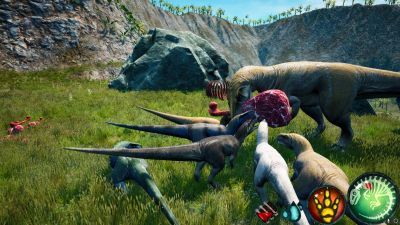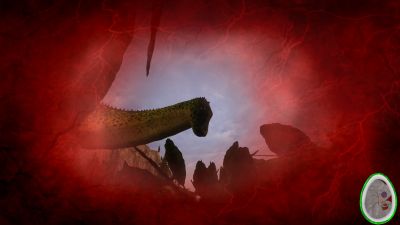Difference between revisions of "Nesting"
m (Grammar Mistake) |
|||
| Line 1: | Line 1: | ||
| − | Nesting is a mechanic that | + | Nesting is a mechanic that was added to Beasts of Bermuda during November of 2018.<br> |
| + | |||
[[File:Ss cef5136138c8bcba18b03255348e64ca028d71f8.1920x1080.jpg|right|thumb|400px|border|An adult [[Megalosaurus]] feeds a horde of babies after a successful hunt.]] | [[File:Ss cef5136138c8bcba18b03255348e64ca028d71f8.1920x1080.jpg|right|thumb|400px|border|An adult [[Megalosaurus]] feeds a horde of babies after a successful hunt.]] | ||
| − | In order to nest, there must be a male and a female | + | In order to nest, there must be a male and a female who are in a pack or herd together and are of the same species. To mate, the two players must also be within a certain distance of one another and have their maximum amount of [[Stamina|stamina]] and [[Ability|ability power]]. If any of these conditions are not met the game prompts you as to why you cannot mate with that player.<br> |
| − | |||
| − | Nesting is divided into two phases - gestation and incubation. Gestation time varies based on health while incubation is 20 minutes regardless of species. All eggs will incubate at the same time. | + | Nesting is divided into two phases - gestation and incubation. Gestation time varies based on health while incubation is 20 minutes regardless of species. All eggs will incubate at the same time.<br> |
| + | |||
| + | |||
| + | When a pair of players mate, the female begins creating an egg. For the female, the egg HUD will show up in the top right corner of their screen (default UI layout). The fullness of the egg icon indicates how far along you are in creating your egg. Once it is full you will be able to lay your egg in a nest created by the male of your pair (only males can create nests, and it costs a significant amount of ability power and stamina to do so).<br> | ||
| + | |||
| − | |||
[[File:Eggview.jpg|right|thumb|400px|border|A baby [[Apatosaurus]] view of its mother from within an egg.]] | [[File:Eggview.jpg|right|thumb|400px|border|A baby [[Apatosaurus]] view of its mother from within an egg.]] | ||
| − | The male can continue mating with the female to develop more eggs so that she is carrying more than one at a time. Different males can also mate with the same female and as such, she will carry eggs that belong to different fathers. | + | The male can continue mating with the female to develop more eggs so that she is carrying more than one at a time, though only once the previous egg conceived has reached at least 25% gestation. Different males can also mate with the same female and as such, she will carry eggs that belong to different fathers.<br> |
| − | |||
| − | From the moment of conception, an egg is vulnerable. If the mother is extremely stressed or gets hit in the stomach hard enough, there will be a high pitched cry, signaling that the egg has been damaged. Eggs can also be damaged once they have been laid. A damaged egg will lead to negative talents. | + | There is a catch to nesting; the female pays a price for carrying these eggs. Each egg increases the rate at which her food decays, the rate at which her water decays, and it drops her comfort a bit. She's also a little bit slower for each egg, so carrying a dozen eggs is a substantial challenge. The Good Parent [[Talent tree|talent]] reduces these effects quite a bit for each point invested in it.<br> |
| + | |||
| + | |||
| + | From the moment of conception, an egg is vulnerable. If the mother is extremely stressed or gets hit in the stomach hard enough, there will be a high pitched cry, signaling that the egg has been damaged. Eggs can also be damaged once they have been laid. A damaged egg will lead to negative talents.<br> | ||
| + | |||
| + | |||
| + | Players can possess the eggs and hop around in them. Once the babies hatch, their skin will be a combination of the parent's skins with some random variation. The babies will also have a chance of inheriting [[talent tree|talents]] their parents obtained. Inherited talents can have +1 or +2. <br> | ||
| − | |||
[[File:Inheritance.png|right|thumb|400px|border| An example of an inherited talent. ]] | [[File:Inheritance.png|right|thumb|400px|border| An example of an inherited talent. ]] | ||
| − | Players will be able to track family relationships using a family tree built into the game. If two related individuals have kids it will result in [[incest]]. | + | Players will be able to track family relationships using a family tree built into the game. If two related individuals have kids it will result in [[incest]].<br> |
| + | |||
| − | + | Some players prefer to nest when their creature is above the age of 1.2, as it means that there are more talents available for their offspring to inherit.<br> | |
Revision as of 02:55, 21 May 2020
Nesting is a mechanic that was added to Beasts of Bermuda during November of 2018.

In order to nest, there must be a male and a female who are in a pack or herd together and are of the same species. To mate, the two players must also be within a certain distance of one another and have their maximum amount of stamina and ability power. If any of these conditions are not met the game prompts you as to why you cannot mate with that player.
Nesting is divided into two phases - gestation and incubation. Gestation time varies based on health while incubation is 20 minutes regardless of species. All eggs will incubate at the same time.
When a pair of players mate, the female begins creating an egg. For the female, the egg HUD will show up in the top right corner of their screen (default UI layout). The fullness of the egg icon indicates how far along you are in creating your egg. Once it is full you will be able to lay your egg in a nest created by the male of your pair (only males can create nests, and it costs a significant amount of ability power and stamina to do so).

The male can continue mating with the female to develop more eggs so that she is carrying more than one at a time, though only once the previous egg conceived has reached at least 25% gestation. Different males can also mate with the same female and as such, she will carry eggs that belong to different fathers.
There is a catch to nesting; the female pays a price for carrying these eggs. Each egg increases the rate at which her food decays, the rate at which her water decays, and it drops her comfort a bit. She's also a little bit slower for each egg, so carrying a dozen eggs is a substantial challenge. The Good Parent talent reduces these effects quite a bit for each point invested in it.
From the moment of conception, an egg is vulnerable. If the mother is extremely stressed or gets hit in the stomach hard enough, there will be a high pitched cry, signaling that the egg has been damaged. Eggs can also be damaged once they have been laid. A damaged egg will lead to negative talents.
Players can possess the eggs and hop around in them. Once the babies hatch, their skin will be a combination of the parent's skins with some random variation. The babies will also have a chance of inheriting talents their parents obtained. Inherited talents can have +1 or +2.
Players will be able to track family relationships using a family tree built into the game. If two related individuals have kids it will result in incest.
Some players prefer to nest when their creature is above the age of 1.2, as it means that there are more talents available for their offspring to inherit.